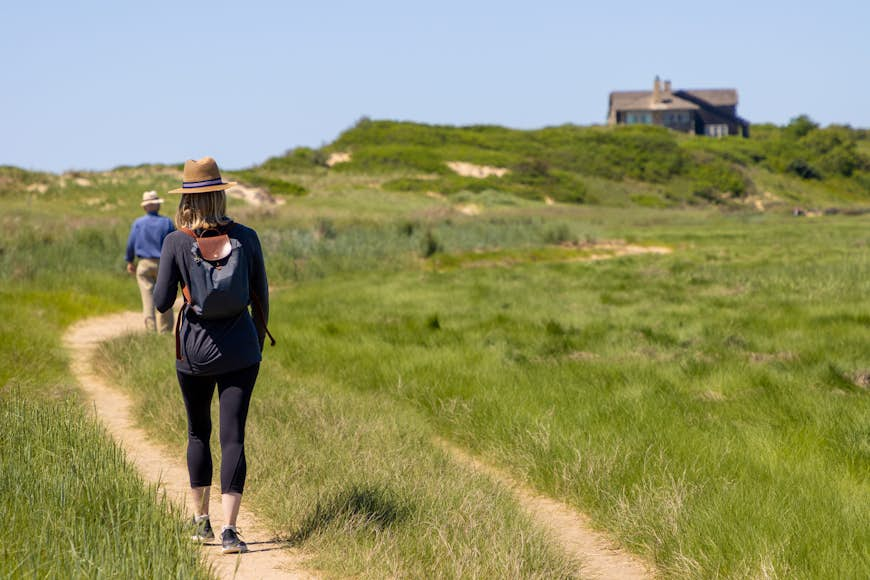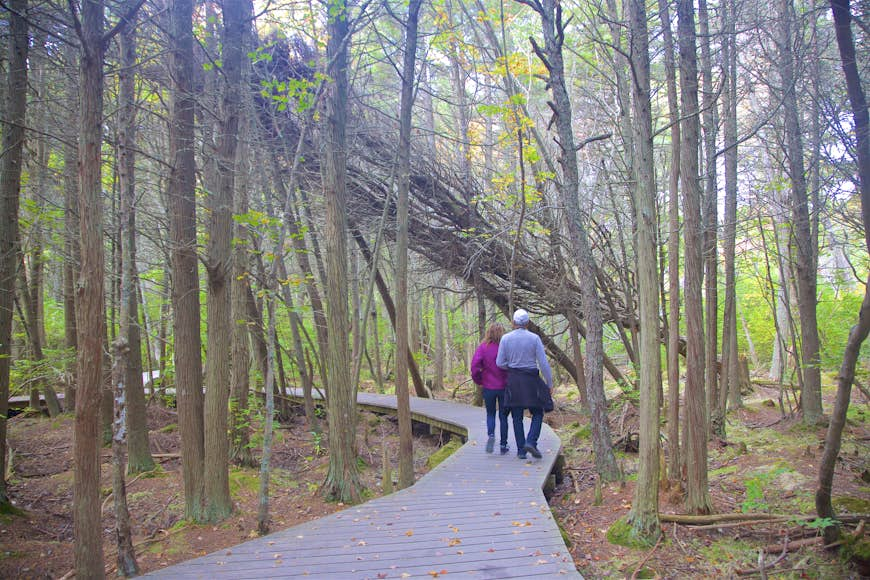While long walks on Cape Cod beaches are a thing for a reason, inland hiking trails offer insight into the Cape’s diverse ecology including marshes, forests and freshwater ponds.
Most Cape Cod hikes tend to be on the short side compared to trails in other parts of the country, but rewards include wildlife views and solitude even during the summer high season. Here are eight of our favorite hikes throughout Cape Cod.
Cliff Pond Loop, Brewster: best hike with dogs
3.2 miles/5.2 km roundtrip, 2 hours
Glaciers that carved the Cape some 15,000 years ago melted to form large inland freshwater ponds called kettle ponds, and some of the best examples of these are found at Nickerson State Park.
At 204 acres, Cliff Pond is the largest pond within the park, and the Cliff Pond Loop edges along its pine and oak-forested banks. The trail opens to several secluded sandy beaches where swimming and fishing are permitted.
Wildlife commonly seen include eastern painted turtles, foxes and herons. Cliff Pond Loop can be added to Little Cliff Pond Trail to make a longer figure-of-eight route. Leashed dogs are allowed on park trails.
Atlantic White Cedar Swamp Trail, Wellfleet: best forest hike
1.2 miles/1.9 km loop, 1 hour
Located within Cape Cod National Seashore, the Atlantic White Cedar Swamp Trail offers a forested contrast to the nearby open beach views. This loop trail drops into shaded pine and oak woods with a carpeted floor of moss and is notable for its grove of endangered Atlantic white cedars.
A plank boardwalk allows hikers to travel through the swamp ecosystem home to several species of birds, including owls and woodpeckers, making it popular with birders and botanists.
The trailhead begins at the Marconi Wireless Station parking lot, with restrooms and picnic tables. Most of the trail is level and accessible, but a few steps down to the boardwalk can hamper wheelchairs. Pets are not allowed on the trail; wear long pants to avoid contact with poison ivy and ticks.
Morris Island Trail, Chatham: best hike for seeing wildlife
1.6 miles/2.5 km loop, 1 hour
This loop trail begins at the Monomoy National Wildlife Refuge visitor center, where guests can learn about horseshoe crabs, diamondback terrapins, seals and insects – vital to the Cape’s ecology.
Morris Island Trail’s sandy, pine-lined path leads through beach plum shrubs to the beach, where plovers and pipers are commonly seen (and the reason pets are not permitted on the trail during nesting season). Hike at low tide as parts of the route are submerged at high tide.
The trail loops inland past ponds and marsh grass meadows affording glimpses of red-wing blackbirds, dragonflies and other inner-coastal critters before returning to the visitor center parking lot.

Dune Shacks Trail, Provincetown: best historic hike
2 miles/3.2 km roundtrip, 3 hours
Part of Cape Cod National Seashore, the Dune Shacks Trail begins from a parking area at the Route 6 and Snail Road intersection. The trail travels through a short section of woods before opening to steep sand dunes and eventually the beach.
Cresting the dunes provides sweeping, dramatic views of this remote stretch of Cape Cod National Seashore below. Pets are not allowed on this trail.
Its namesake dune shacks are part of the Dune Shacks of the Peaked Hills Historic District. Originally built in the 1860s as life-saving stations for shipwrecked sailors, the shacks were written about by Henry David Thoreau in his 1865 book, Cape Cod. These quiet, remote shacks became the summer studios of writers and artists including Jack Kerouac, E.E. Cummings, Norman Mailer, Eugene O’Neill and Jackson Pollock.
The simple shacks have no plumbing or electricity and are still used by artists who apply via lotteries to stay and work in them. Hikers may view these 19 historic cabins but are asked not to enter them or the grounds to respect the occupants’ privacy.
Sea Farms Marsh Trail, Falmouth: best hike for birdwatching
1.2 miles/1.9 km roundtrip, 1 hour
Sea Farms Marsh Trail travels through 87 acres of marsh and woodlands preserved from development along 2-mile-long Bourne’s Pond and Israel’s Cove. Keep an eye out for foxes, blue heron, osprey, marsh hawks and diamondback terrapins.
Benches look out to picturesque coves and make perfect spots for observing the many species of birds that call this area home. Bourne’s Pond is popular for swimming, kayaking and fishing, and an inlet opens it to the ocean and Menauhant Beach.

Green Briar Nature Center and Jam Kitchen: best hike with kids
2 miles/3.2 km roundtrip, 1.5 hours
Once the home of children’s books author and conservationist Thornton Burgess, these grounds now contain the Green Briar Nature Center. The walking paths meander through gardens, wildflower plots and protected land, including Smiling Pool pond and the briar patch featured in many of Burgess’ Peter Rabbit stories.
After meandering the trails through the conservation area’s 57-acres, visit the historic Green Briar Jam Kitchen. Started in 1903 by Ida Putnam, the kitchen is now a living museum where visitors can learn the process of traditional jamming and can purchase fruit jams made onsite.
Menemsha Hills Reservation Trail, Martha’s Vineyard: best hike for views
3.7 miles/6 km roundtrip, 2 hours
One of the Cape’s longest and most diverse hikes, Menemsha Hills Reservation Trail travels through wetlands, forest groves, coastal plains and steep cliffs before topping Prospect Hill, the second-highest point on Martha’s Vineyard.
At a whopping 308ft above sea level, Menemsha Hills offer dramatic views of Menemsha harbor, the Elizabeth Islands and Gay Head Lighthouse. Leashed dogs are permitted.
Sandy Neck Nature Trail, Barnstable: best hike for camping
2 miles/2.5 km roundtrip, 1.5 hours
The Sandy Neck Nature Trail explores the dunes, marshes and intertidal zones behind Sandy Neck Beach that faces north to Cape Cod Bay.
From the ranger station, the Marsh Trail travels east for about 1.6 miles behind the dunes through the marsh zone where brackish water is home to garter snakes, diamondback terrapins and box turtles, tree swallows and red-winged blackbirds. The Marsh Trail then connects with a 0.4-mile-long Trail #1 that heads north to the beach.
Leashed dogs are permitted on the Sandy Neck Nature Trail, and limited free parking is available. Sandy Neck Beach is six miles long, and off-highway vehicles are permitted on the beach.
Tent camping is also available in the oak forest near the beach at established sites. This area is a great hiking and camping destination with beach access and starry night skies over Cape Cod Bay.
Tips for hiking Cape Cod
- Ticks can be a problem when hiking through grassy areas. Check yourself and children frequently for ticks, especially at the tops of socks, waistlines and scalps. Don’t forget to check dogs, especially around the collar and ears.
- Poison ivy can also be present. Stay on designated trails to avoid coming in contact with this three-leaved nuisance.
- Deer flies, mosquitoes, and biting gnats called “no-see ums” can be an issue. Use bug repellent, especially in marshy areas.
- Many Cape trails don’t have restrooms or drinking water, so make sure to be prepared before setting off.
- Many public areas on the Cape restrict dogs for periods due to bird nesting sites. Make sure you know rules regarding pets on the trail beforehand. Dogs must always be leashed on public land. Bring plastic bags to pack out waste.
